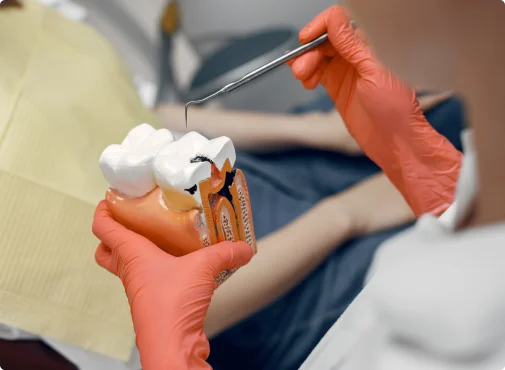Understanding Tooth Cavities: Insights from a Trusted Dentist in Chester Springs
Tooth decay is a common dental problem that can lead to cavities if not addressed in time. According to the dentists in Chester Springs, plaque buildup is the primary cause of most cavities. Plaque, when mixed with sugar and starch, activates bacteria in the mouth, leading to the erosion of tooth enamel, leaving the tooth vulnerable to the formation of cavities.
While tooth cavities may not always display noticeable symptoms, early detection is crucial to prevent further complications. A reputable dentist in Chester Springs, such as Dr. Makani of Eagle Family Smiles, uses advanced technology such as Diagnodent laser cavity detection to identify cavities in their early stages, making intervention easier. He also specializes in providing laser dentistry services in Downingtown, which can make treatments less invasive and more comfortable.

Some symptoms of tooth decay include toothache, visible pits or holes on the teeth, and increased sensitivity to hot or cold foods and drinks. Regular dental check-ups can help identify tooth cavities before these symptoms occur. For those needing complete dentures in Glenmoore or implant dentures in Chester Springs, Dr. Makani provides comprehensive treatment options to restore functionality and aesthetics to your smile.
Dental fillings are a common treatment option for early-stage cavities, which can be placed in a single visit and can last a lifetime with proper dental care. Other treatment options may include inlays, onlays, and dental crowns. However, advanced stages of tooth decay may require a root canal to restore the tooth’s health.
It is worth noting that tooth decay is also prevalent in children, making pediatric dentistry crucial in preventing and treating tooth cavities in children and adolescents. Dr. Makani offers comprehensive dental care to families to prevent tooth decay and promote healthy mouths.
Scheduling regular dental check-ups with an experienced dentist in Chester Springs is the best way to prevent tooth cavities and other dental complications. We provide effective dental recommendations and treatments to help keep your oral health in check.
Children are more susceptible to getting cavities, but anyone with poor oral hygiene, a diet high in sugar and starch, or genetics that make their teeth prone to decay can be at risk.
Most tooth decay can be treated with a dental filling. However, if the cavity has gone too long without treatment, it may be too severe for a simple filling. In these cases, a dental crown, inlay, or onlay may be necessary. In both cases, the decayed portion of the tooth will be removed and replaced with a filling, crown, inlay, or onlay to protect the tooth from further damage.
To help manage the pain, the dentist will administer a local anesthetic in the area around the tooth that is being treated. For most people, this is enough to eliminate feeling any pain. However, during the treatment, you will feel some pressure while the dentist works on the tooth. After the numbing begins to fade, you may feel some tingling in your mouth and some minor sensitivity. This should fade in a few days, and you may take some over-the-counter pain relievers if you experience any discomfort.
The best way for adults to prevent dental cavities is to practice good oral hygiene. Brush your teeth twice a day with fluoride toothpaste, floss daily, limit sugary and starchy foods, and visit your dentist for regular check-ups and cleanings.
If left untreated, dental cavities can lead to tooth pain, infection, tooth loss, and even more serious health issues such as heart disease and diabetes. Regular dental check-ups and prompt treatment of cavities can help prevent these consequences.